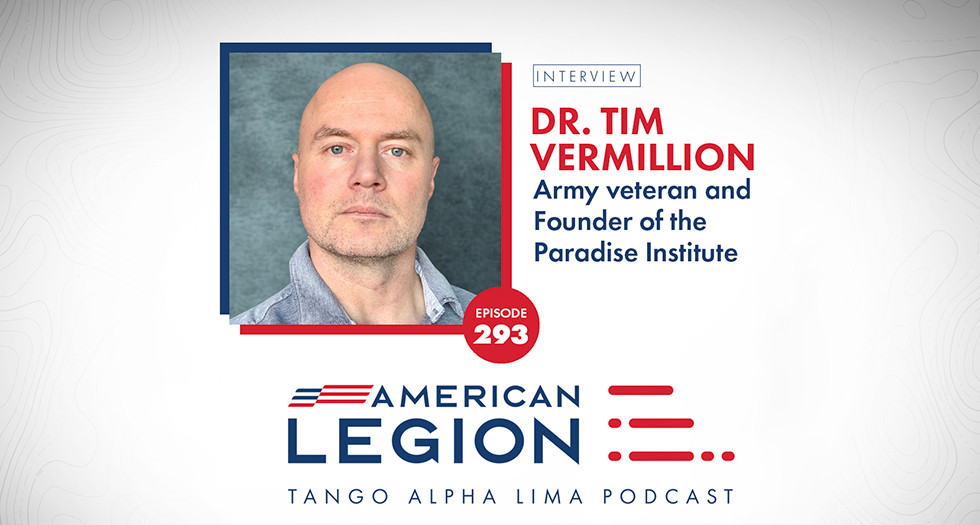
Iraq War veteran Dr. Timothy Vermillion discusses his harm reduction approach to veteran mental health and suicide prevention in the new episode of the Tango Alpha Lima podcast.
Dr. Timothy D. Vermillion is a licensed clinical social worker, Iraq War veteran, and behavioral health officer with over 25 years of military service.
He began his career as a medic before being commissioned as a behavioral health officer, currently holding the rank of major in the Army National Guard. “We are here to serve the warfighter,” he says as the special guest in today’s episode of The American Legion Tango Alpha Lima podcast. “I am serving the warfighter both in the service and out of the service.”
Vermillion has worked at the Department of Veterans Affairs since 2010, specializing in trauma therapy, and serves on the Board of Directors for the EMDR International Association.
Veterans have a higher rate of suicide, smoking and alcoholism as compared to the general population. Those factors have led Vermillion to focus on harm-reduction efforts. He estimates that 60 veterans die each day from smoking-related causes.
“The first harm-reduction thing we can do is to get people off the cigarettes and onto vaping or pouches or some other nicotine-replacement therapy that is not going to literally kill them over time,” he says.
Vermillion is the founder of the Paradise Institute, which helps veterans untangle trauma, reconnect with purpose, and move from surviving to living through expert trauma-informed therapy, and transition and leadership coaching.
The Paradise Institute offers Eye Movement Desensitization and Reprocessing (EMDR) therapy, advanced trauma treatment and clinician training.
One of the first steps of EMDR, a memory-based therapy, is for the therapist to identify events that cause distress and identify the beliefs the patient has about those events.
Vermillion says that the therapy involves creating space in the mind for the patient to reduce focus on the jarring memory. He says it’s like shaking up a bottle of soda, then letting the fizz out. The drink (or the memory) is still present but the action has reduced the pressure.
“The memory is still there but how you experience the memory is different,” he explains. “The goal is to experience the memory differently and then they can then have an adaptive resolution, like ‘I’m not a bad person.”
He works with clients on understanding their purpose, developing a path forward and achieving whatever goals they have.
“One of the things we need to talk about is all that stuff that you’ve gone through has really given you leadership, perseverance, commitment. All these qualities that once you leave the military and hit that wall — what do I do now? There’s no one telling you what to do. There’s some people who end up getting stuck, they don’t know what to do.”
Vermillion says he, too, also deals with mental health issues. “I have a therapist of my own,” he says. “Getting care as a therapist is important. You need to take care of yourself so you can take care of others.”
Also in this episode co-hosts Stacy Pearsall and Joe Worley talk about:
• Project Athena — a visual map connecting the memories of those who served in Afghanistan to their coordinates.
• “Angel’s Glow,” and why it took almost 140 years to understand it.
You can also check out the more than 300 Tango Alpha Lima podcasts available in both audio and video formats here. You can also download episodes on Apple Podcasts, Spotify other major podcast-hosting sites. The video version is available at the Legion’s YouTube channel.
- Podcast

